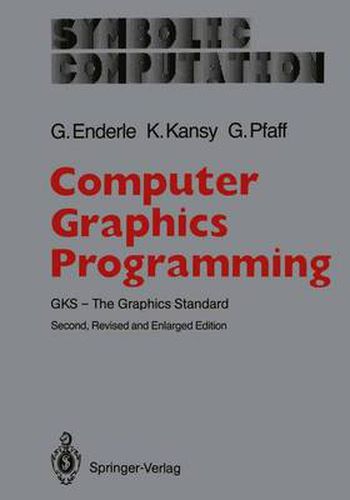Readings Newsletter
Become a Readings Member to make your shopping experience even easier.
Sign in or sign up for free!
You’re not far away from qualifying for FREE standard shipping within Australia
You’ve qualified for FREE standard shipping within Australia
The cart is loading…






This title is printed to order. This book may have been self-published. If so, we cannot guarantee the quality of the content. In the main most books will have gone through the editing process however some may not. We therefore suggest that you be aware of this before ordering this book. If in doubt check either the author or publisher’s details as we are unable to accept any returns unless they are faulty. Please contact us if you have any questions.
TO COMPUTER GRAPHICS BASED ONGKS Part I gives an introduction to basic concepts of computer graph ics and to the principles and concepts of GKS. The aims of this part are twofold: to provide the beginner with an overview of the terminology and concepts of computer graphics, based on GKS, and to give the computer graphics expert an introduc tion to the GKS standard. In the early chapters of this part, the main areas of computer graphics, the various classes of com puter graphics users, the interfaces of GKS and its underlying design concepts are discussed and important terms are defined. The later chapters give an informal introduction to the main concepts of GKS and their interrelationships: output, attributes, coordinate systems, transformations, input, segments, metafile, state lists, and error handling. This introduction to the GKS framework will prepare the ground for the detailed description of 2D GKS functions in Part III and the 3D extensions to GKS in Part IV. 1 WHAT IS COMPUTER GRAPHICS? 1. 1 Defmition of Computer Graphics The Data Processing Vocabulary of the International Organization for Stan dardization (ISO) [ISO 84] defines Computer Graphics as follows: Methods and techniques for converting data to and from a graphic display via computer.
This definition refers to three basic components of any computer graphics system - namely data , computer , and display .
$9.00 standard shipping within Australia
FREE standard shipping within Australia for orders over $100.00
Express & International shipping calculated at checkout
This title is printed to order. This book may have been self-published. If so, we cannot guarantee the quality of the content. In the main most books will have gone through the editing process however some may not. We therefore suggest that you be aware of this before ordering this book. If in doubt check either the author or publisher’s details as we are unable to accept any returns unless they are faulty. Please contact us if you have any questions.
TO COMPUTER GRAPHICS BASED ONGKS Part I gives an introduction to basic concepts of computer graph ics and to the principles and concepts of GKS. The aims of this part are twofold: to provide the beginner with an overview of the terminology and concepts of computer graphics, based on GKS, and to give the computer graphics expert an introduc tion to the GKS standard. In the early chapters of this part, the main areas of computer graphics, the various classes of com puter graphics users, the interfaces of GKS and its underlying design concepts are discussed and important terms are defined. The later chapters give an informal introduction to the main concepts of GKS and their interrelationships: output, attributes, coordinate systems, transformations, input, segments, metafile, state lists, and error handling. This introduction to the GKS framework will prepare the ground for the detailed description of 2D GKS functions in Part III and the 3D extensions to GKS in Part IV. 1 WHAT IS COMPUTER GRAPHICS? 1. 1 Defmition of Computer Graphics The Data Processing Vocabulary of the International Organization for Stan dardization (ISO) [ISO 84] defines Computer Graphics as follows: Methods and techniques for converting data to and from a graphic display via computer.
This definition refers to three basic components of any computer graphics system - namely data , computer , and display .